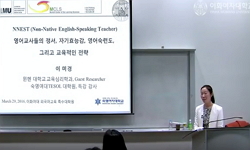The purpose of this study is to investigate how self-leadership contributes to organizational efficiency by identifying the mediating role of individual inner variables activated when kindergarten teachers` self-leadership influences their job attitud...
http://chineseinput.net/에서 pinyin(병음)방식으로 중국어를 변환할 수 있습니다.
변환된 중국어를 복사하여 사용하시면 됩니다.
- 中文 을 입력하시려면 zhongwen을 입력하시고 space를누르시면됩니다.
- 北京 을 입력하시려면 beijing을 입력하시고 space를 누르시면 됩니다.

매개변인으로서의 개인내적변인을 고려한 유치원 교사의 자기지도성(Self-Leadership)과 직무태도 간 구조분석 = A structural analysis of kindergarten teachers` self-Leadership and job attitude considering individual inner variables as mediators
한글로보기https://www.riss.kr/link?id=A99577356
- 저자
- 발행기관
- 학술지명
- 권호사항
-
발행연도
2012
-
작성언어
-
- 주제어
-
KDC
300
-
등재정보
KCI등재
-
자료형태
학술저널
- 발행기관 URL
-
수록면
217-242(26쪽)
-
KCI 피인용횟수
13
- DOI식별코드
- 제공처
- 소장기관
-
0
상세조회 -
0
다운로드
부가정보
다국어 초록 (Multilingual Abstract)
The purpose of this study is to investigate how self-leadership contributes to organizational efficiency by identifying the mediating role of individual inner variables activated when kindergarten teachers` self-leadership influences their job attitude. The study`s participants consisted of 628 kindergarten teachers in Gyeong-gi Province(302 public kindergarten teachers and 326 private kindergarten teachers). The collected data were wirelessly classified by using PASW 18.0 (sample 1, sample 2). Sample 1 used exploratory factors for screening self-leadership, and sample 2 was used to analyze structural equation modeling. The results are as follows: First, the study`s hypothetical model that kindergarten teachers` self-leadership affects their job satisfaction and organizational commitment through self-efficacy and internal locus of control of individual inner variables was found to be reasonable model fit. Second, kindergarten teachers` self-efficacy and internal locus of control behave as mediators in the context of self-leadership and its impact on job satisfaction and organizational commitment. These findings provide basic data for developing education programs that could maximize the effects of kindergarten teachers` self-leadership.
참고문헌 (Reference)
1 박용진, "학교장의 수퍼리더십과 교사의 셀프리더십, 교사의 학교조직몰입 및 학교조직건강간의 관계 연구" 인하대학교 대학원 2009
2 홍세희, "특별기고: 구조 방정식 모형의 적합도 지수 선정기준과 그 근거" 19 (19): 161-177, 2000
3 이순자, "초등학교 병설유치원 교직문화의 특질" 중앙대학교 대학원 2002
4 이란희, "초등학교 교사의 셀프리더십과 직무만족도의 관계 : 서울시 초등학교 교사를 중심으로" 한국교원대학교 교육대학원 2012
5 장제익, "체육교사의 셀프리더십과 조직헌신 및 직무만족과의 관계" 고려대학교 교육대학원 2009
6 김진수, "직장인을 위한 셀프리더십 프로그램의 개발과 효과" 경성대학교 대학원 2009
7 김은정, "조직문화와 셀프리더십이 직무만족과 조직몰입에 미치는 영향" 중앙대학교 산업·창업경영대학원 2009
8 이목화, "자기효능감이 조직몰입에 미치는 영향 : 직무의 경력유용성과 집단효능감의 조절효과를 중심으로" 고려대학교 대학원 2003
9 박동수, "자기유능감과 직무성과간의 관계에 대한 셀프리더십의 매개작용" 한국인사조직학회 10 (10): 135-159, 2002
10 권명은, "임파워먼트와 조직유효성 관계에 셀프리더십이 미치는 조절효과 분석" 단국대학교 경영대학원 2006
1 박용진, "학교장의 수퍼리더십과 교사의 셀프리더십, 교사의 학교조직몰입 및 학교조직건강간의 관계 연구" 인하대학교 대학원 2009
2 홍세희, "특별기고: 구조 방정식 모형의 적합도 지수 선정기준과 그 근거" 19 (19): 161-177, 2000
3 이순자, "초등학교 병설유치원 교직문화의 특질" 중앙대학교 대학원 2002
4 이란희, "초등학교 교사의 셀프리더십과 직무만족도의 관계 : 서울시 초등학교 교사를 중심으로" 한국교원대학교 교육대학원 2012
5 장제익, "체육교사의 셀프리더십과 조직헌신 및 직무만족과의 관계" 고려대학교 교육대학원 2009
6 김진수, "직장인을 위한 셀프리더십 프로그램의 개발과 효과" 경성대학교 대학원 2009
7 김은정, "조직문화와 셀프리더십이 직무만족과 조직몰입에 미치는 영향" 중앙대학교 산업·창업경영대학원 2009
8 이목화, "자기효능감이 조직몰입에 미치는 영향 : 직무의 경력유용성과 집단효능감의 조절효과를 중심으로" 고려대학교 대학원 2003
9 박동수, "자기유능감과 직무성과간의 관계에 대한 셀프리더십의 매개작용" 한국인사조직학회 10 (10): 135-159, 2002
10 권명은, "임파워먼트와 조직유효성 관계에 셀프리더십이 미치는 조절효과 분석" 단국대학교 경영대학원 2006
11 서미연, "유치원장의 교사능력개발 지원정도와 교사의 직무만족 및 조직몰입간의 관계" 세종대학교 행정대학원 2004
12 신미숙, "유치원 교사의 자기지도성과 조직몰입과의 관계" 한국교원대학교 교육대학원 2010
13 김현지, "유치원 교사의 자기지도성과 배경변인 및 직무만족의 관계" 한국교원대학교 대학원 2010
14 조부경, "유치원 교사의 자기지도성(self-leadership)과 교사 자아개념 및 조직풍토와의 관계" 교육연구원 25 (25): 71-91, 2009
15 단현국, "유치원 교사의 성격 특성과 교사 신념" 18 (18): 205-222, 1998
16 박근희, "유치원 교사의 배경변인에 따른 자아개념과 직무만족도에 관한 연구" 한국교원대학교 교육대학원 2003
17 최옥주, "유아교사의 셀프리더십 영향요인에 관한 연구" 건국대학교 행정대학원 2011
18 박은혜, "유아교사론" 창지사 2003
19 김지영, "신입직원의 셀프리더십, 직무만족 및 조직몰입과의 상관성 연구" 연세대학교 교육대학원 2006
20 이은숙, "슈퍼리더십과 셀프리더십이 자기권능감과 성과에 미치는 영향에 관한 탐색적 연구" 17 : 277-286, 2000
21 김수자, "셀프리더십훈련 프로그램이 유아교육기관 교사들의 셀프리더십과 직무만족에 미치는 영향" 경성대학교 대학원 2006
22 김연선, "셀프리더십이 팀웍과 자기효능감, 직무만족, 조직몰입 및 직무성과에 미치는 영향 : 특급호텔 Wine & Dining Restaurant 을 중심으로" 세종대학교 대학원 2009
23 김용일, "셀프리더십이 조직몰입과 직무만족에 미치는 영향에 관한 연구 : 조직특성의 조절효과를 중심으로" 숭실대학교 대학원 2008
24 오왕묵, "셀프리더십이 군조직 유효성에 미치는 영향에 관한 연구" 국방대학교 국방관리대학원 2001
25 하순복, "셀프리더십의 선행요인과 결과요인에 관한 연구" 서울대학교 대학원 2007
26 김소령, "셀프리더십 훈련 프로그램이 초등학교 아동의 리더십과 자기효능감에 미치는 효과" 한국교원대학교 교육대학원 2006
27 조부경, "셀프리더십 교육활동이 예비유아교사의 자기효능감 및 교직에 대한 인식에 미치는 효과" 한국열린유아교육학회 16 (16): 93-115, 2011
28 조경희, "셀프-리더십이 간호사의 직무만족 및 간호업무성과에 미치는 영향" 고려대학교 교육대학원 2003
29 이계헌, "셀프-리더십과 조직구성원의 직무 만족도 및 조직몰입도와의 관계" 부산대학교 경영대학원 2001
30 정태희, "셀프 리더십 교육이 대학생의 셀프 리더십과 자존감 증진에 미치는 효과" 한국교육개발원 32 (32): 223-248, 2005
31 윤지민, "성인의 셀프리더십에 영향을 미치는 개인적 특성" 중앙대학교 대학원 2011
32 김정자, "성격특성과 셀프리더십의 관계에 관한 연구" 울산대학교 대학원 2011
33 김쌍언, "상사특성, 조직특성, 개인특성과 구성원태도간의 관계에 대한 셀프리더십의 매개효과에 관한 연구" 울산대학교 대학원 2008
34 안성철, "변혁적 리더십과 조직구성원의 직무성과간의 관계에 대한 자기효능감과 직무몰입의 매개효과에 관한 연구" 한양대학교 대학원 2009
35 김민정, "대학생의 셀프 리더십 개발에 영향을 미치는 학습자 변인 연구" 이화여자대학교 대학원 2007
36 김선희, "단설유치원 교사의 직무만족도에 관한 연구" 울산대학교 교육대학원 2005
37 김원배, "기업근로자의 셀프 리더십과 직무 만족에 관한 연구" 연세대학교 산업대학원 2001
38 김주환, "구조방정식으로 논문쓰기" 커뮤니케이션북스 2009
39 문수백, "구조방정식 모델링의 이해와 적용" 학지사 2009
40 김세일, "교사의 셀프리더십과 학교장의 서번트 리더십이 직무만족도에 미치는 영향" 건국대학교 교육대학원 2011
41 Manz, C. C., "Vicarious learning: The influence of modeling on organizational behavior" 6 (6): 105-113, 1981
42 Manz, C. C., "Thought self-leadership: The influence of self-talk and mental imagery on performance" 13 : 681-699, 1992
43 Neck, C. P., "Thought self-leadership: The influence of self-talk and mental imagery on performance" 13 : 681-699, 1992
44 Neck,C. P, "Thought self-leadership: The impact of mental strategies on employee cognition, behavior, and affect" 17 : 445-467, 1996
45 Neck, C. P., "Thought self-leadership as a framework for enhancing the performance of performance appraisers" 31 : 278-302, 1995
46 Dolbier, C. L., "The relationships between self-leadership and enhanced psychological, health, and work outcomes" 135 (135): 469-475, 2001
47 Sims, H. P., "The new leadership paradigm: Social learning and cognition in organization" Sage Publication 1992
48 Conger, J. A., "The empowerment process: Integrating theory and practice" 13 (13): 471-482, 1988
49 조부경, "The Relationships of Kindergarten Teacher's Self-leadership, Job Satisfaction and Director's Super-leadership" 한국유아교육학회 16 (16): 159-179, 2010
50 Bandura, A., "Social foundations of thought and action: A social cognitive theory" Prentice-Hall 1986
51 Manz,C.C., "Self-leadership: Toward an expanded theory of self-influence processes in organizations" 11 (11): 585-600, 1986
52 Prussia, G. E., "Self-leadership and performance outcomes: The mediating influence of self-efficacy" 19 (19): 523-538, 1998
53 Bandura, A., "Self-efficacy in human agency" 37 : 122-147, 1982
54 Stajkovic, A. D., "Self-efficacy and work-related performance: A meta-analysis" 124 (124): 240-261, 1998
55 Schunk, D. H., "Self-efficacy and cognitive skill learning, In Research on motivation in education" Academic 13-44, 1989
56 Cohn, E., "Research on effective schools: Implications for less developed countries" 31 : 377-399, 1987
57 Ponto, M. T., "Relationship between student's locus of control and satisfaction" 8 (8): 176-181, 1999
58 Kline, R. B., "Principles and practice of structural equation modeling" The Guilford Press 2005
59 Williams, S., "Personality and self-leadership" 7 (7): 139-155, 1997
60 Skinner, E. A., "Perceived control: Motivation, coping and development, In In self-efficacy: Thought control of action" Hemisphere Publishing Corporation 91-106, 1992
61 Feltz, D., "Path analysis of the causal elements in Bandura's theory of self-efficacy and an anxiety-based model of avoidance behavior" 42 : 764-781, 1982
62 Mowday, R. T., "Organizational linkage: The psychology of commitment, absenteeism, and turnover" Academic Press 1982
63 DiLiello, T. C., "Maximizing organizational leadership capacity for the future: Toward a model of self-leadership, innovation and creativity" 21 (21): 319-337, 2006
64 Gifford, D. D., "Locus of control: Academic achievement and retention in a sample of university first-year students" 19 : 18-25, 2006
65 Keller, J., "Locus of control and the flow experience: An experimental analysis" 22 : 589-607, 2008
66 Mitchell, T. R., "Locus of control" 18 (18): 623-631, 1975
67 Huang, H. W., "Kindergarten teacher job satisfaction and the need for continuing education in southern taiwan" University of South Dakata 2001
68 Klein, J. D., "Influence of student ability, locus of control, and type of instructional control on performance and confidence" 83 (83): 140-146, 1990
69 Neck, C. P., "How self-leadership affects the goal-setting process" 13 (13): 691-707, 2003
70 Bandura, A., "Guide for constructing self-efficacy scales, In Self-efficacy beliefs of adolescents" H. H. Freeman 307-337, 2006
71 Kazan, A. L., "Exploring the concept of self-leadership: Factors impacting self-leadership of Ohio Americorps Members" Ohio State University 1999
72 Allen, N. J., "Examination of the combined effects of work values and early work experiences on organizational commitment" 19 : 29-52, 1990
73 Roberts, H. E., "Evaluating the interaction between self-leadership and work structure in predicting job satisfaction" 12 : 257-267, 1998
74 Pieper, K., "Effects of self-confidence, feedback sign, and feedback type on performance" 1991
75 Bandura, A., "Effects of perceived controllability and performance standards on self-regulation of complex decision making" 41 : 586-598, 1989
76 Lange, R. V., "Dimensionality and reliability of the Rotter I-E locus of control scale" 45 (45): 398-406, 1981
77 Levenson, H., "Differentiating among internality, powerful others, and chance, In Research with the locus of control construct" Academic Press 15-63, 1981
78 Bandura, A., "Differential engagement of self-reactive influences in cognitive motivation" 38 : 92-113, 1986
79 Avolio, B. J., "Developing transformational leadership: A lifespan approach, In Charismatic leadership: The elusive factor in organizational effectiveness" Jorssey-Bass 276-308, 1988
80 Houghton, J. D., "Constructive thought strategies and job satisfaction: A preliminary examination" 22 (22): 33-45, 2007
81 Bentler, P. M., "Comparative fit indices in structural models" 107 : 238-246, 1990
82 김연하, "Bandura의 교사 자기 효능감 척도(Teacher Self-efficacy Scale) 요인구조 분석" 한국유아교육학회 28 (28): 169-191, 2008
83 Sobel, M. E., "Asymptotic intervals for indirect effects in structural equations models, In Sociological methodology" Jossey-Bass 290-312, 1982
84 Ko, J. W., "Assessment of Meyer & Allen's three-component model of organizational commitment in South Korea" 82 : 961-973, 1997
85 Browne, M. W., "Alternative ways of assessing model fit, In Testing structural equation models" Sage 1993
동일학술지(권/호) 다른 논문
-
국공립어린이집 초기 운영과정에서 나타나는 원장의 어려움과 극복과정 탐색
- 한국유아교육학회
- 권경숙 ( Kyung Sook Kwon )
- 2012
- KCI등재
-
- 한국유아교육학회
- 이영애 ( Young Ae Lee )
- 2012
- KCI등재
-
- 한국유아교육학회
- 김은영 ( Eun Young Kim )
- 2012
- KCI등재
-
유아교사의 과학 교과교육학지식과 과학교수 태도에 있어서 과학교수 불안의 매개효과 연구
- 한국유아교육학회
- 김다영 ( Da Young Kim )
- 2012
- KCI등재
분석정보
인용정보 인용지수 설명보기
학술지 이력
| 연월일 | 이력구분 | 이력상세 | 등재구분 |
|---|---|---|---|
| 2026 | 평가예정 | 재인증평가 신청대상 (재인증) | |
| 2020-01-01 | 평가 | 등재학술지 유지 (재인증) |  |
| 2017-01-01 | 평가 | 등재학술지 유지 (계속평가) |  |
| 2013-01-01 | 평가 | 등재학술지 유지 (등재유지) |  |
| 2010-01-01 | 평가 | 등재학술지 유지 (등재유지) |  |
| 2008-01-01 | 평가 | 등재학술지 유지 (등재유지) |  |
| 2006-01-01 | 평가 | 등재학술지 유지 (등재유지) |  |
| 2004-01-01 | 평가 | 등재학술지 유지 (등재유지) |  |
| 2001-01-01 | 평가 | 등재학술지 선정 (등재후보2차) |  |
| 1998-07-01 | 평가 | 등재후보학술지 선정 (신규평가) |  |
학술지 인용정보
| 기준연도 | WOS-KCI 통합IF(2년) | KCIF(2년) | KCIF(3년) |
|---|---|---|---|
| 2016 | 2.72 | 2.72 | 2.8 |
| KCIF(4년) | KCIF(5년) | 중심성지수(3년) | 즉시성지수 |
| 2.74 | 2.67 | 3.087 | 0.56 |




 KCI
KCI KISS
KISS





